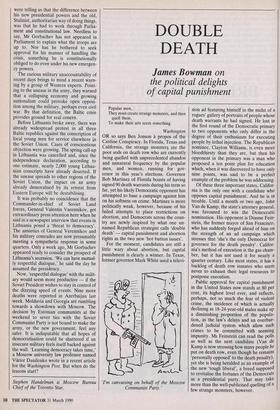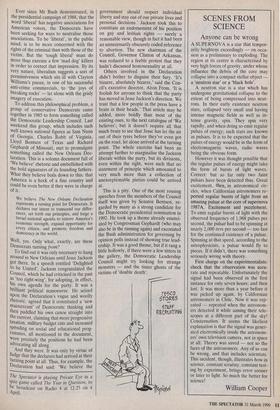DOUBLE DEATH
James Bowman on
the political delights of capital punishment
Popular men, They must create strange monsters, and then quell them, To make their arts seem something.
Washington OR so says Ben Jonson a propos of the Catiline Conspiracy. In Florida, Texas and California, the strange monsters are the poor sods on death row who are currently being quelled with unprecedented abandon and unnatural frequency by the popular men, and women, running for gov- ernor in this year's elections. Governor Bob Martinez of Florida boasts of having signed 90 death warrants during his term so far, yet his likely Democratic opponent has attempted to base a campaign against him on his softness on crime. Martinez is more politically weak, however, because of his failed attempts to place restrictions on abortion, and Democrats across the coun- try are newly inspired by what one un- named Republican strategist calls 'double death' — capital punishment and abortion rights as the two new 'hot button issues'.
For the moment, candidates are still a little wary about abortion, but capital punishment is clearly a winner. In Texas, former governor Mark White used a televi- 'I'm canvassing on behalf of the Moscow Communist Party.' sion ad featuring himself in the midst of a rogues' gallery of portraits of people whose death warrants he had signed. He lost in the first round of the Democratic primary to two opponents who only differ in the degree of their enthusiasm for executing people by lethal injection. The Republican nominee, Clayton Williams, is even more bloodthirsty than they are, but then his opponent in the primary was a man who proposed a ten point plan for education which, when it was discovered to have only nine points, was said to be a perfect example of the problem he was addressing.
Of these three important states, Califor- nia is the only one with a candidate who opposes capital punishment. And he is in trouble. Until a month or two ago, John Van de Kamp, the state's attorney general, was favoured to win the Democratic nomination. His opponent is Dianne Fein- stein, the former mayor of San Francisco, who has suddenly forged ahead of him on the strength of an ad campaign which stresses that 'she's the only Democrat for governor for the death penalty'. Califor- nia's method of execution is the gas cham- ber, but it has not used it for nearly a quarter century. Like most states, it has a backlog of death row inmates who seem never to exhaust their legal resources to postpone execution.
Public approval for capital punishment in the United States now stands at 80 per cent, its highest level ever, and reflects, perhaps, not so much the fear of violent crime, the incidence of which is actually declining as 18-24-year-old males make up a diminishing proportion of the popula- tion, as the law's delays and an overbur- dened judicial system which allow such crimes to be committed with seeming impunity. Ms Feinstein can read the polls as well as the next candidate (Van de Kamp is now stressing how many people he put on death row, even though he remains `personally opposed' to the death penalty), yet she is being heralded as an example of the new 'tough liberal', a breed supposed to revitalise the fortunes of the Democrats as a presidential party. That may take more than the well-publicised quelling of a few strange monsters, however. Ever since Mr Bush demonstrated, in the presidential campaign of 1988, that the word 'liberal' has negative associations for American voters, the Democrats have been seeking for ways to neutralise those associations. To be 'liberal', in the public mind, is to be more concerned with the rights of the criminal than with those of the victim. But the 'tough liberal' must do more thap execute a few 'mad dog' killers in order to correct that impression. By its very nature, liberalism suggests a sort of permissiveness which sits ill with Clayton Williams's paean, in one of his successful anti-crime commercials, to 'the joys of breaking rocks' — let alone with the grisly imagery of execution.
To address this philosophical problem, a group of conservative Democrats came together in 1985 to form something called the Democratic Leadership Council. Last weekend this group, which includes such well known national figures as Sam Nunn of Georgia, Charles Robb of Virginia, Lloyd Bentsen of Texas and Richard Gephardt of Missouri, met to promulgate something called the New Orleans Dec- laration. This is a solemn document full of We believe' rhetoric and embellished with the bold signatures of its founding fathers. What they believe boils down to this: that America is a heck of a fine country and could be even better if they were in charge of it.
We believe The New Orleans Declaration represents a turning point for Democrats. It declares our intent to transcend our differ- ences, set forth our principles, and forge a broad national agenda to restore America's economic strength, expand opportunity for every citizen, and promote freedom and democracy in the world.
Well, yes. Only what, exactly, are these Democrats turning from? To find out it was only necessary to hang around in New Orleans until Jesse Jackson got there. In a speech entitled 'Delighted to be United', Jackson congratulated the Council, which he had criticised in the past as 'too right-wing', for adopting, in effect, his own agenda for the party. It was a brilliant political manoeuvre. He seized upon the Declaration's vague and woolly rhetoric, agreed that it constituted a 'new mainstream' of Democratic thinking and then paddled his own canoe straight into the current, claiming that more progressive taxation, military budget cuts and increased spending on social and educational prog- rammes, all mentioned in the document, were precisely the positions he had been advocating all along. And they were. It was only by virtue of fudge that the declarers had arrived at their turning point at all. Thus, for example, the Declaration had said: 'We believe the The Spectator is playing Private Eye in a quiz game called The Year in Question, to be broadcast on Radio 4 at 12.25 on 4 April. government should respect individual liberty and stay out of our private lives and personal decisions.' Jackson took this to constitute an endorsement of his position on gay and lesbian rights — surely a reasonable view, though in fact it had been an unnecessarily obscurely coded reference to abortion. The new chairman of the Council, Governor Clinton of Arkansas, was reduced to a feeble protest that they hadn't discussed homosexuality at all.
Others involved in the Declaration didn't bother to disguise their fury. 'It's bizarre, absolutely bizarre,' said the Con- cil's executive director, Alvin From. 'It is foolish for anyone to think that the party has moved in Jesse Jackson's direction. We trust that a few people in the press have a brain in their heads.' That article may be added, more boldly than most of the existing ones, to the next catalogue of 'We believes'; but it doesn't require all that much brain to see that Jesse has let the air out of their tyres before they've even got on the road, let alone arrived at the turning point. The whole exercise had been an attempt further to marginalise the Jackson liberals within the party, but its divisions, even within the right, were such that no statement of principle which amounted to very much more than a collection of unexceptionable pieties could be arrived at.
This is a pity. One of the most rousing speeches from the members of the Council itself was given by Senator Bentsen, re- garded by many as a strong candidate for the Democratic presidential nomination in 1992. He took up a theme already enunci- ated by Congressman Gephardt (who may also be in the running again) and excoriated the Bush administration for governing by opinion polls instead of showing true lead- ership. It was a good theme, but if it rang a little hollowly, if there were a few titters in the gallery, the Democratic Leadership Council might try looking for strange monsters — and the tinier ghosts of the victims of 'double death'.



























































 Previous page
Previous page